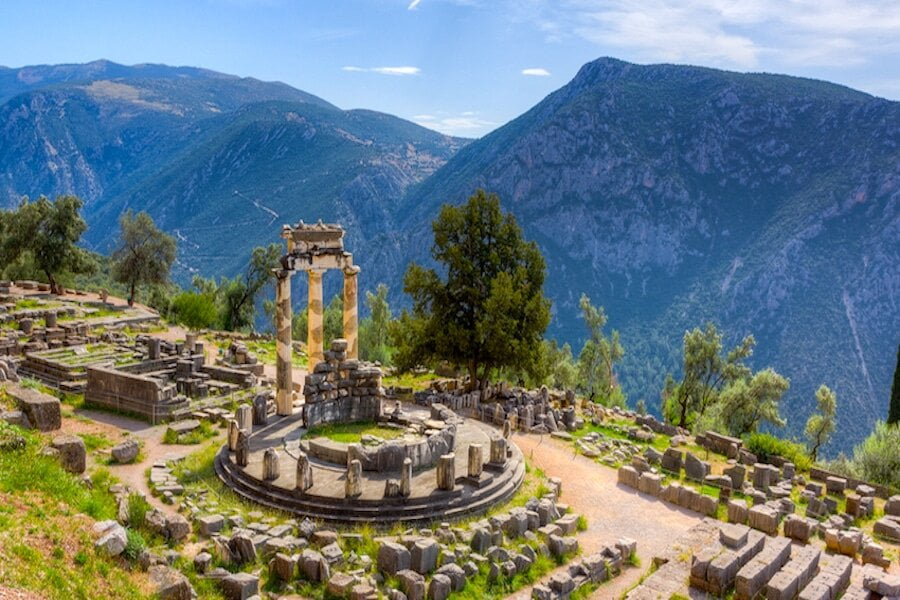Delphi, lying in the foothills of Mount Parnassus, was the most famous oracle of ancient Greece and, for many centuries, was its spiritual and religious centre.
The history of Delphi has been lost in prehistory and mythology. From the 8th century BCE, when the worship of Apollo was at its peak, the sanctuary of Delphi acquired an essential role in the ancient Greek world. Its influence expanded by stages to a large portion of the Eastern Mediterranean. It reached its zenith between the 6th and 4th centuries BCE.
No one doubted the credibility of its oracles, uttered by the priestess of the oracle, Pythia. Before giving her oracles, Pythia cleansed herself, imbibed water from the Castalian spring, chewed on bay leaves and sat on a tripod as fumes arose from the burning of various psychotropic herbs. Pythia would enter an ecstatic trance and make incoherent utterances, which the priests of Apollo would translate into oracular verse whose meaning was almost always ambiguous.
Cities, leaders and ordinary people consulted with the god and gave rich offerings to the oracle. Delphi maintained its important position until the end of the 4th century CE, at which point the oracular rites were terminated by the decree of the Byzantine emperor Theodosius the First.
The region’s cuisine is influenced by the rugged mountains, nearby valleys, and the coastline of the Corinthian Gulf, allowing for a variety of fresh and local ingredients. Here are some highlights of the gastronomy in Delphi and the surrounding region:
1. Local Ingredients and Dishes
- Olives and Olive Oil: Delphi is close to the famous olive groves of Amfissa, producing high-quality olives and olive oil. These olives, known for their size and distinctive flavour, often appear in local dishes or are enjoyed simply as appetizers.
- Feta and Local Cheeses: Central Greece is known for its delicious cheeses, including feta, manouri, and formaella, a semi-hard cheese from nearby Arachova. These cheeses are featured in salads, pies, or grilled dishes.
- Legumes: Lentils, chickpeas, and beans are essential ingredients in traditional Greek cooking, often served in soups, salads, or stews, providing hearty, filling options.
- Mountain Greens: Wild greens and herbs, such as horta (boiled wild greens) and mountain oregano, are commonly used. These greens are nutritious and often served as side dishes or with olive oil and lemon.
2. Traditional Dishes
- Souvlaki and Gyro: Although these are popular throughout Greece, they’re also a staple in Delphi. Grilled meats are served with pita, tzatziki, and vegetables.
- Kontosouvli and Kokoretsi: These grilled meat dishes, typically made with pork or lamb, are seasoned with herbs and spices and cooked on a spit. They’re trendy during festivals and special occasions.
- Pies (Pites): Savory pies like spinach pie (spanakopita), cheese pie (tiropita), and a variety of other stuffed pastries are standard and are often made with homemade phyllo dough.
- Roasted Lamb and Goat: Central Greece, including Delphi, is known for its roasted lamb and goat dishes, often seasoned with rosemary, garlic, and lemon.
3. Desserts
- Baklava and Kataifi: These classic Greek desserts, made with phyllo dough, nuts, honey, and spices, are often enjoyed with coffee.
- Walnut Pie (Karidopita): A sweet, syrup-soaked walnut cake famous in Delphi and central Greece.
- Loukoumades are small, honey-soaked doughnuts, often topped with cinnamon or crushed nuts.




